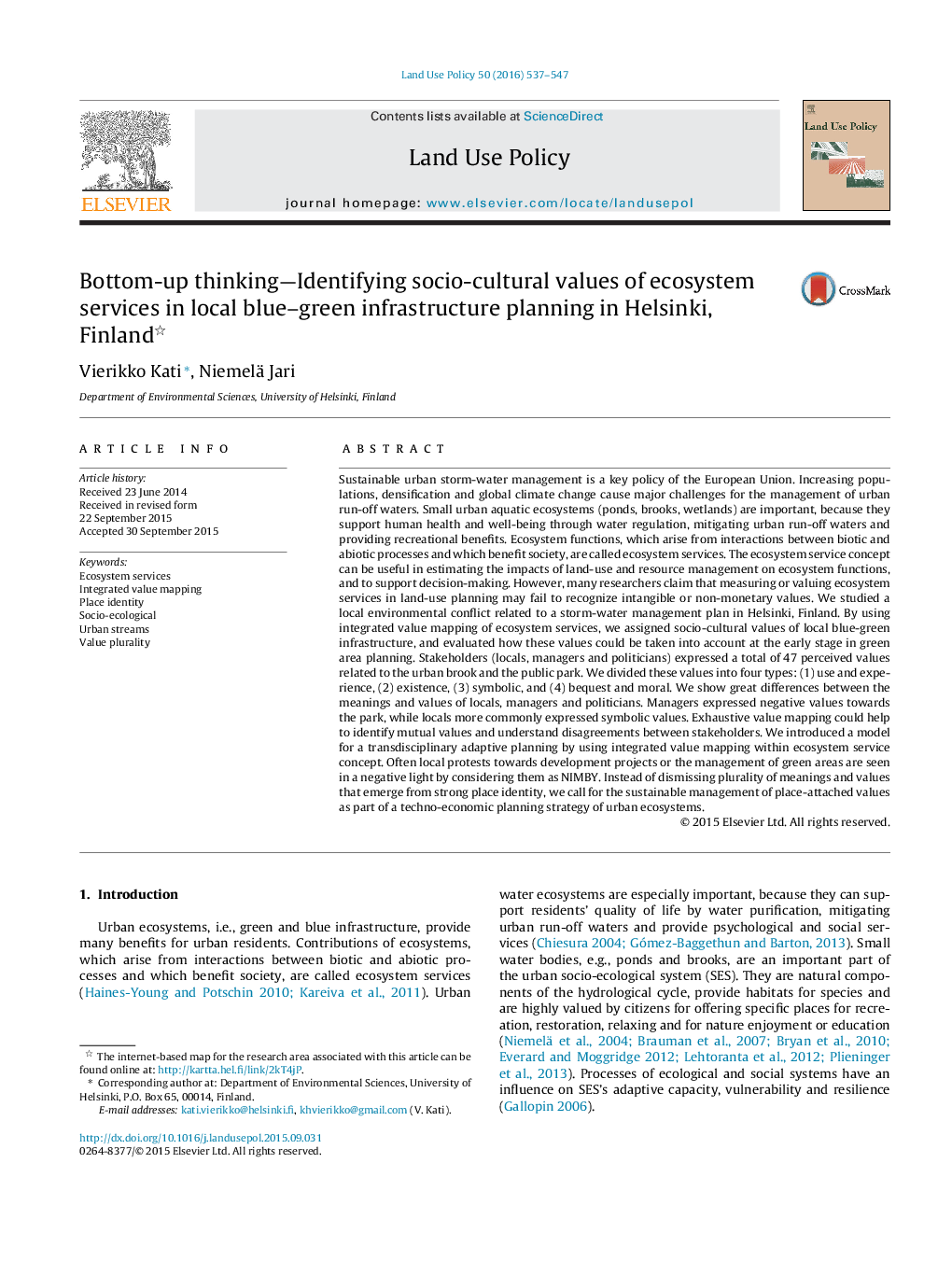| کد مقاله | کد نشریه | سال انتشار | مقاله انگلیسی | نسخه تمام متن |
|---|---|---|---|---|
| 6547709 | 160095 | 2016 | 11 صفحه PDF | دانلود رایگان |
عنوان انگلیسی مقاله ISI
Bottom-up thinking-Identifying socio-cultural values of ecosystem services in local blue-green infrastructure planning in Helsinki, Finland
ترجمه فارسی عنوان
پایین انداختن - شناسایی ارزش های اجتماعی و فرهنگی خدمات اکوسیستم در برنامه های زیربنایی محلی آبی سبز در هلسینکی، فنلاند
دانلود مقاله + سفارش ترجمه
دانلود مقاله ISI انگلیسی
رایگان برای ایرانیان
کلمات کلیدی
خدمات محیط زیستی، نقشه برداری یکپارچه، هویت محل، اجتماعی و اکولوژیکی، جریانهای شهری، چندگانگی ارزش،
موضوعات مرتبط
علوم زیستی و بیوفناوری
علوم کشاورزی و بیولوژیک
جنگلداری
چکیده انگلیسی
Sustainable urban storm-water management is a key policy of the European Union. Increasing populations, densification and global climate change cause major challenges for the management of urban run-off waters. Small urban aquatic ecosystems (ponds, brooks, wetlands) are important, because they support human health and well-being through water regulation, mitigating urban run-off waters and providing recreational benefits. Ecosystem functions, which arise from interactions between biotic and abiotic processes and which benefit society, are called ecosystem services. The ecosystem service concept can be useful in estimating the impacts of land-use and resource management on ecosystem functions, and to support decision-making. However, many researchers claim that measuring or valuing ecosystem services in land-use planning may fail to recognize intangible or non-monetary values. We studied a local environmental conflict related to a storm-water management plan in Helsinki, Finland. By using integrated value mapping of ecosystem services, we assigned socio-cultural values of local blue-green infrastructure, and evaluated how these values could be taken into account at the early stage in green area planning. Stakeholders (locals, managers and politicians) expressed a total of 47 perceived values related to the urban brook and the public park. We divided these values into four types: (1) use and experience, (2) existence, (3) symbolic, and (4) bequest and moral. We show great differences between the meanings and values of locals, managers and politicians. Managers expressed negative values towards the park, while locals more commonly expressed symbolic values. Exhaustive value mapping could help to identify mutual values and understand disagreements between stakeholders. We introduced a model for a transdisciplinary adaptive planning by using integrated value mapping within ecosystem service concept. Often local protests towards development projects or the management of green areas are seen in a negative light by considering them as NIMBY. Instead of dismissing plurality of meanings and values that emerge from strong place identity, we call for the sustainable management of place-attached values as part of a techno-economic planning strategy of urban ecosystems.
ناشر
Database: Elsevier - ScienceDirect (ساینس دایرکت)
Journal: Land Use Policy - Volume 50, January 2016, Pages 537-547
Journal: Land Use Policy - Volume 50, January 2016, Pages 537-547
نویسندگان
Vierikko Kati, Niemelä Jari,
